
Published 8:46 PM, April 05, 2016
MANILA, Philippines – The Securities and Exchange Commission (SEC) has filed a criminal complaint with the Department of Justice (DOJ) against a woman allegedly selling securities from controversial firms to the public without a license.
The complaint was filed against Mary Grace Miranda Lapid who the SEC said violated Republic Act 8799 or the Securities and Regulation Code.
She was accused of selling unregistered securities without a salesman's license involving Emgoldex, Global Intergold (GIG) and Prosperous Infinite Philippines Holdings Corporation (PIPHC).
All 3 firms already have pending cases with the DOJ and are Ponzi-type or pyramid schemes that have mainly attracted young Filipinos and overseas Filipino workers.
Soliciting through Facebook
The case against Lapid stemmed from the complaint of a Gloreyna B. Reyes, who claimed that the respondent is actively soliciting investments for GIG and PIPHC through Facebook.
Reyes said Lapid identifies herself as a agent of GIG and is "actively promoting, advertising and posting the marketing program of GIG and PIPHC as well as some photos of the other members of GIG and PIPHC especially Mr. Kevin Miranda who is a renowned 'Grand Upline' of GIG and PIPHC on Facebook."
Reyes said she was convinced by Lapid to invest money worth P36,000 ($777.9) per share in GIG and was promised a return of P180,000. ($3,889) and required to recruit two other investors.
She was also convinced to make additional investments although she hasn’t realized the promised funds.
Upon investigation, the SEC said Lapid has no Certificate of Registration or License as capital market professional as associate person, compliance officer, salesman, and/or certified investment solicitor or a broker dealer of securities, investment house, underwriter of securities, investment company adviser, and/or mutual fund distributor.
Firms with existing cases
The regulatory body filed a case against Emgoldex, reportedly a Dubai-based firm which recruits investors to buy gold online with the promise of hefty bonuses for referring friends and acquaintances in November of last year.
The SEC also filed raps against GIG and PIPHC soon after, although the the Zurich-based GIG has since informed the SEC that an “unscrupulous group was misusing its name."
The SEC had repeatedly warned the public against investment scams, saying that if an offer sounds too good to be true – promising hefty returns for little investment – it most likely is.
Despite this, numerous scams have continously come to light.
Last month, estafa charges were filed against 15 executives of a trading corporation for allegedly duping their clients of over P1 billion ($21.61 million) through an investment scam.










0 comments:
Post a Comment